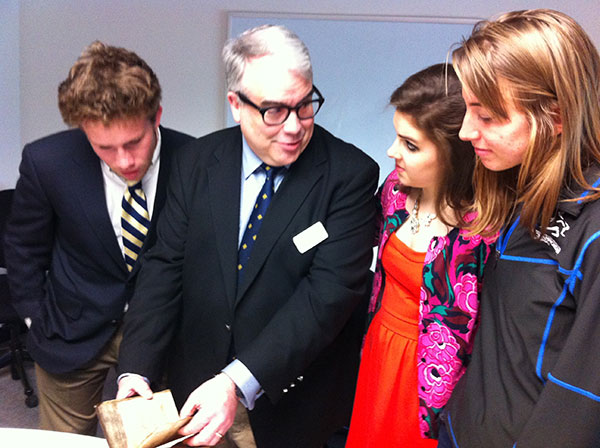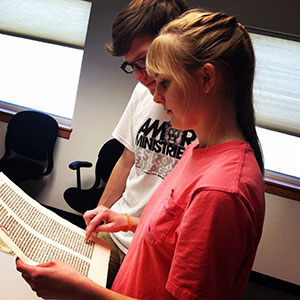
Professor Steve Sheppard and Bumpers College honors students (l-r) Andrew Dugan, Christina Crowder and Grace Heymsfield examine a ca. 1350 copy of the Magna Carta, currently on display in Mullins Library.
Honors students enjoyed an opportunity to examine, touch and discuss rare historical documents in Mullins Library yesterday. Pages from the Gutenberg Bible, a leather-bound, ca. 1350 copy of the Magna Carta and the front page of the Sept. 23, 1862 Issue of the New York Times, where the Emancipation Proclamation was printed for the first time, are currently on display in Mullins as part of an exhibition featuring rare materials from the Remnant Trust.

Honors students Hogan Heathington and Shana Kolesar examine a page from the Gutenberg Bible, the first printed book.
Hogan Heathington, a mechanical engineering/physics major, was especially taken with the copy of the Magna Carta, written in a fine chancery script with notations in the margins. “That’s real gold,” he said, pointing to an illuminated letter decorated with elaborate swirls of blue and gilt, “but it’s the lapis used for the blue that was most valuable then.”
Steve Sheppard, associate dean for research and faculty development and the William H. Enfield Distinguished Professor of Law, dropped by to give the big picture background on the pocket-sized Magna Carta, one of many copies of the Charter and statutes distributed to courts and noblemen across England. “This was the 1350 version of the Arkansas Code,” he explained. The original Magna Carta (literally, “Great Charter”) was a large scroll presented in 1215 to the perfidious King John, whose penchant for seizing juicy bits of his subjects’ land holdings and raising taxes made him unpopular with England’s most powerful nobles. King John was forced to seal the document under oath, but repudiated it the following day, eventually launching a civil war.
Prof. Sheppard used historic prints, broadsides, paintings and a clip from the 1968 film The Lion in Winter to sketch out the story, then distributed slips of paper so that the students could role play the barons, bishops and alderman who drew up the laundry list of demands that is the Magna Carta. He also distributed copies of an English translation of the document, which the students examined closely.
“There are some really loopy things in the Magna Carta,” Sheppard said in response to a question about some of the more questionable clauses, such as one that limits the rights of women. “The biggest thing we got out of it is that there are requirements to use the power of state, by law.”
The Bumpers College Honors Student Board hosted the event.
“This event was an incredible opportunity to engage and learn about the Magna Carta, a document essential to the history of our nation’s government,” said Christina Crowder, an honors dietetics major.
These and other historical documents are included in the “Wisdom of the Ages Athenaeum” exhibit, on display in the lobby of Mullins Library through Monday, May 12. Library staff are “on call” to open the cases Monday – Friday from 10-11 a.m. and from 2–3 p.m., and on Saturdays from 2-3 p.m. Just ask at the main information desk
